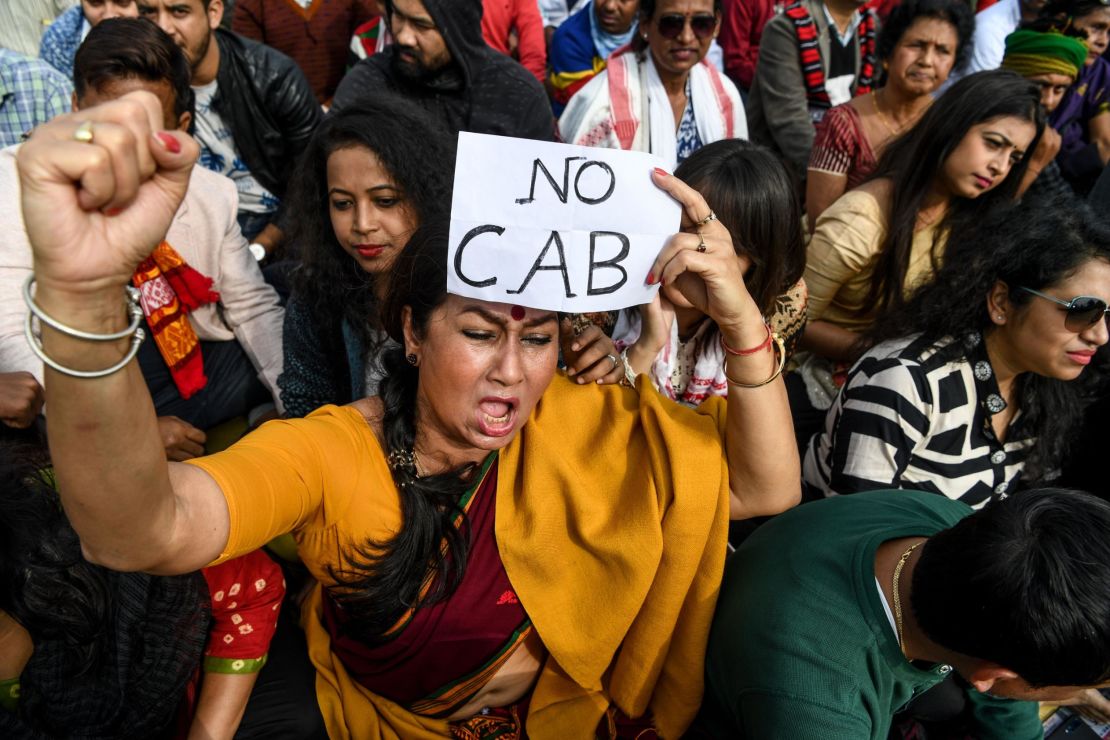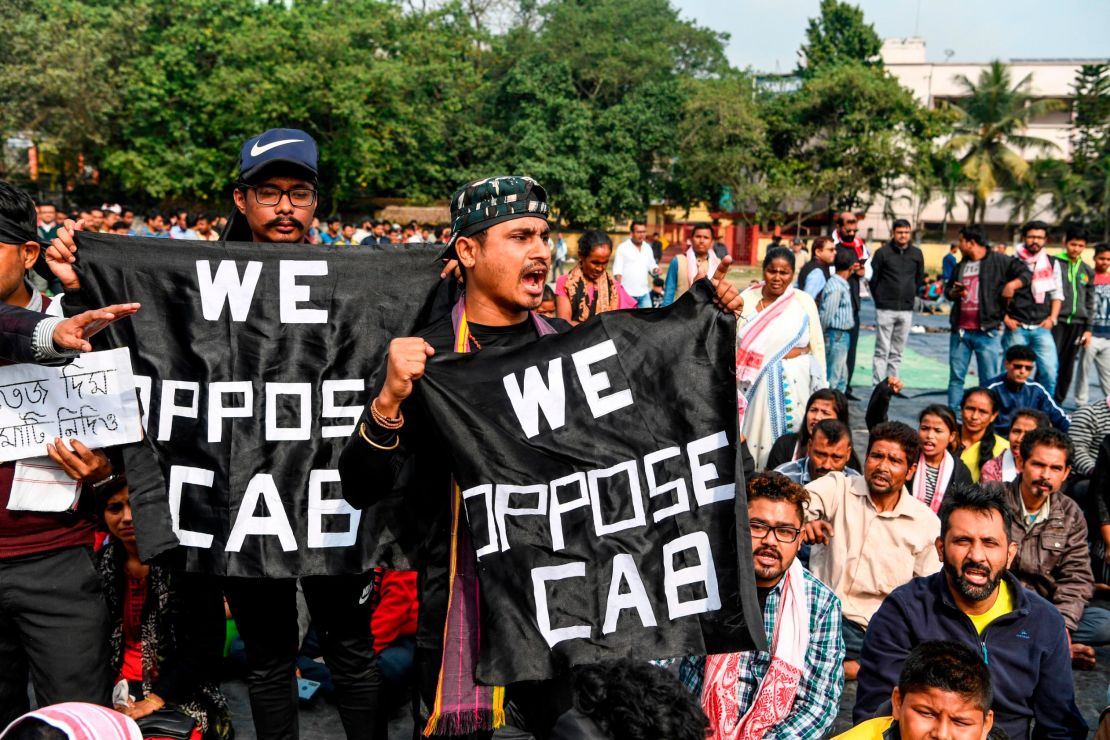Hundreds of people joined a hunger strike in northeast India after a controversial citizenship bill was approved this week, which opponents worry will marginalize non-Hindu voices in one of India’s most ethnically diverse regions.
Protesters took to the streets across the states of Assam and Tripura after the government officially approved the Citizenship Amendment Bill (CAB). The new law could give Indian citizenship to immigrants from three neighboring countries – but not if they are Muslim.
Opposition parties say the bill is unconstitutional as it bases citizenship on a person’s religion and would further marginalize India’s 200 million-strong Muslim community.

The unrest turned deadly Thursday when two people died in Guwahati, the capital of Assam and the state’s most important city. According to Dr. Ramen Talukdar, the superintendent of Guwahati Medical College and Hospital, they were brought to a hospital with bullet wounds. Another 26 were injured, though seven have been discharged, he added.
India’s army deployed an extra 2,000 troops to Assam and Tripura as the protests continued.
Army spokesperson Abhijeet Mitra told CNN that 26 units had been deployed to Assam, while three were sent to Tripura. There are approximately 70 soldiers per unit.
‘We demand justice’
Mehraj Khan, whose friend was one of the young men killed, said at the time that they were walking back from where a procession had been taking place “and suddenly six vehicles … stopped nearby and they threw a stun grenade to disperse the protestors.”
“As soon as they threw the stun grenade, they switched off their car light and … started firing,” he said.
Khan said he saw his friend’s blood and brains on the ground after the incident.
A relative of one of the men shot said the police reaction was unwarranted: “We demand justice, are we not Assamese citizens, why shoot own people?”
About 1,800 people have been detained in Tripura since Wednesday, according to Rajiv Singh of the Tripura police force.
Thousands defied a government curfew Thursday to attend a meeting announced by the All Assam Students Union (AASU), which is also organizing the hunger strike.
With large numbers of troops on the streets and communication disrupted, residents could be seen stocking up on necessities like milk and eggs in grocery stores, amid fears of further chaos.
Controversial legislation
Indian Prime Minister Narendra Modi and his Bharatiya Janata Party (BJP) have described the CAB as a means of protecting vulnerable groups from persecution, but critics say the true target is India’s minority Muslim population and risks undermining the country’s secular constitution.
“Today marks a dark day in the constitutional history of India,” Sonia Gandhi, president of the opposition Congress Party, said in a statement. “The passage of the citizenship amendment bill marks the victory of narrow-minded and bigoted forces over India’s pluralism.”
Another leading Congress figure, Rahul Gandhi, said the law was an attempt to “ethnically cleanse the North East. It is a criminal attack on the North East, their way of life and the idea of India.”

Modi said Congress and other opposition groups were spreading “lies and more lies” about the law, adding it is “in line with our ethos of assimilation and compassion, it ensures a better life for persecuted minorities from other nations.”
CAB promises to fast-track citizenship for religious minorities, including Hindus, Sikhs, Buddhists, Jains, Parsis and Christians, from Afghanistan, Bangladesh and Pakistan. But the exclusion of Muslims – which Modi says is because they are not minorities in India’s neighbors – has raised concerns about the bill’s constitutionality and the growing anti-Muslim rhetoric in India.
“There is a short-term and long-term objective to polarize India’s voters on the basis of religious lines,” said Harsh Mander, a human rights activist and author. “The BJP and its ideological partner Rashtriya Swayamsevak Sangh (have) never accepted the constitution and the citizenship of this country and they have the leverage now and the numbers to effectively destroy India’s constitution, recreating India according to their imagination as a Hindu state.”
India’s northeast is home to more than 200 distinct indigenous minority groups. Both Assam and Tripura share a border with Bangladesh and some see the arrival of foreigners as a cultural threat regardless of religion – for others, anti-immigrant sentiment remains closely tied to religious divisions.
Many indigenous groups there fear that giving citizenship to large numbers of immigrants, who came over the porous border with Bangladesh following independence in 1971, would change the unique ethnic make-up of the region and their way of life, regardless of religion. There are around 16 million Hindus in Bangladesh alone, and naturalizing large numbers of immigrants could also greatly impact employment, government subsidies and education.
Images from the protests show crowds chanting slogans and holding signs that read, “We are Assamese and proud” and “Tripura is not the dumping ground of illegal migrants.”
“The northeast is (like) a separate country, it has so many races, religious groups, cultures, around (200) ethnic groups and we are still grappling to live together here,” said Patricia Mukhim, a writer and editor at Shillong Times, the region’s oldest English-language daily.
“We fear that we will become a demographic minority” if large numbers of Hindus are granted citizenship, she added. “All of us are very wary about that and then there is the case of that there are not enough jobs to go by, enough living space even.”
Critics of the CAB say it is another example of how Modi and his BJP party have pushed an agenda of Hindu nationalism onto secular India, a country of 1.3 billion people, at the expense of the Muslim population.
The bill comes months after Modi’s government stripped the majority-Muslim state of Jammu and Kashmir of its autonomous status, essentially giving New Delhi more control over the region’s affairs and enabling mass Hindu migration to the region. That same month, nearly two million people in Assam were left off a controversial new National Register of Citizens, which critics feared could be used to justify religious discrimination against Muslims in the state.
CNN’s Swati Gupta, Joshua Berlinger, Jessie Yeung and Helen Regan contributed to this report




















